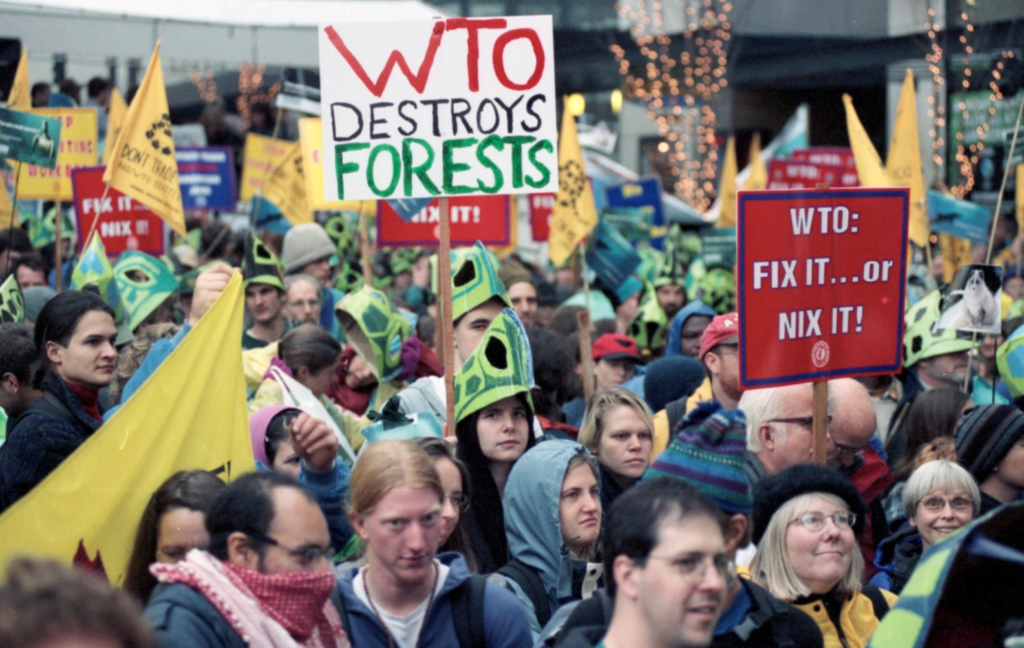I don’t usually laugh when I read the front page of the Sunday New York Times. I get mad. I get depressed. All kinds of emotions on my Sunday morning. But it’s typically not high comedy.
Then today there was this headline:
Why It Seems Everything We Knew About the Global Economy Is No Longer True

Here’s the nut:
The economic conventions that policymakers had relied on since the Berlin Wall fell more than 30 years ago — the unfailing superiority of open markets, liberalized trade and maximum efficiency — look to be running off the rails.
Even better:
Associated economic theories about the ineluctable rise of worldwide free market capitalism took on a similar sheen of invincibility and inevitability. Open markets, hands-off government and the relentless pursuit of efficiency would offer the best route to prosperity.
But:
It turned out that markets on their own weren’t able to automatically distribute gains fairly or spur developing countries to grow or establish democratic institutions.
No, in fact, free-market economic globalization created vast economic inequality, a problem so severe that economist Thomas Piketty says it threatens the stability of our entire modern civilization. It helped create massive climate change that is absolutely threatening civilization.
It also, the Times notes,
Help us save local journalism!
Every tax-deductible donation helps us grow to cover the issues that mean the most to our community. Become a 48 Hills Hero and support the only daily progressive news source in the Bay Area.
Pushed down wages at home and undercut workers’ bargaining power, spurring anti-immigrant sentiments and strengthening hard-right populist leaders like Donald Trump in the United States, Viktor Orban in Hungary and Marine Le Pen in France.
Why?
In advanced industrial giants like the United States, Britain and several European countries, political leaders turned out to be unable or unwilling to more broadly reapportion rewards and burdens.
Nor were they able to prevent damaging environmental fallout. Transporting goods around the globe increased greenhouse gas emissions. Producing for a world of consumers strained natural resources, encouraging overfishing in Southeast Asia and illegal deforestation in Brazil. And cheap production facilities polluted countries without adequate environmental standards.
None of this is funny. But I had to laugh.
I tell my journalism students to avoid the passive voice at all times and all costs. Passive voice allows actors to avoid agency. “Mistakes were made.” Civilians were killed. People were forced into poverty.
None of that makes clear who made the mistakes, or killed the civilians, or drove people into poverty. Someone did those things; they weren’t random acts of nature.
So here’s the Times:
It was believed that a new world where goods, money and information crisscrossed the globe would essentially sweep away the old order of Cold War conflicts and undemocratic regimes.
Excuse me? “It was believed?” By whom?
Well, among others, by The New York Times.
And The Washington Post. And the Los Angeles Times. And every other major newspaper in the country. All of them cheered relentlessly for market-drive approaches, for what we now call the Neoliberal Agenda.
Nobody at any of these news outlets, other than a very occasional opinion columnist, every questioned whether the massive changes brought on by late-stage global capitalism would be anything but positive.
Democrats said they believed this, most of them, including Bill Clinton, Hillary Clinton, Barack Obama, and Joe Biden. Republicans said they believed this, almost all of them. The mainstream economists who got quoted in the news media all went along.
These are human actors who sided with an economic philosophy that is literally threatening the future of humanity.
But the idea that nobody knew the system was going to fail, or that “everything we knew about the global economy is no longer true,” is laughable.
A whole lot of people, pretty much all of the US economic left, warned about this decades ago. There were (and still are) huge protests against Nafta and GATT, two classic neoliberal policies. Occupy Wall Street warned about this. Bernie Sanders warned about it. A few labor unions warned about it.

And yet, The New York Times and the rest of the mainstream news media dismissed protesters as crazy violent anarchists, and ignored the very clear message.
I love this:
political leaders turned out to be unable or unwilling to more broadly reapportion rewards and burdens.
Um, yes: Tax cuts for the rich, over and over, never effectively repealed by Democrats or Republicans, leading to massive deficits, great wealth, and terrible poverty, the likes of which the US hasn’t seen in at least half a century.
Mostly with the support of The New York Times.
“What we knew about the global economy is no longer true?” What a cosmic cop-out. Many of us knew about the problems with the global economy a long time ago. It’s not that the glory of entirely market-based solutions is “no longer true.” It was never true. And now, after the proponents of neoliberalism have done such cataclysmic damage, they are suddenly realizing it didn’t work.
But nobody seems to want to say they were wrong. And until they do, it’s going to be hard to fix this disaster they have foisted on us.
Meanwhile:
The Times two weeks ago discovered a “Renter’s Utopia,” a place where housing costs don’t overwhelm urban residents, where people pay such a small part of their income in rent that they can save for retirement and create “generational wealth” without owning property.
Where? Someplace that had followed the Yimby line of deregulating everything and allowing developers to build wherever and whatever they want? Actually, no: The place where that version of neoliberalism has worked doesn’t exist.
What does exist is “red Vienna,” a place where the socialists built 60,000 units of non-market public housing. A place where many people pay less than five percent of their income on rent.
From writer Francesca Mari:
Imagine if your housing expenses were more like the Schachingers’. Imagine having to think about them to the same degree that you think about your restaurant choices or streaming-service subscriptions. Imagine, too, where the rest of your income might go, if you spent much less of it on housing. Vienna invites us to envision a world in which homeownership isn’t the only way to secure a certain future — and what our lives might look like as a result.
Yes, imagine if the US government funded enough non-market social housing for at least ten percent of the urban population, as in Vienna. Rents would come down everywhere. Homelessness would be rare and short-term. American cities would thrive as they haven’t in decades.
The people who have been making the decisions on housing policy have been wrong for more than half a century. The Times seems to have finally discovered that.
Again: Only when we admit that the current system is a failure do we have any hope of changing it.




